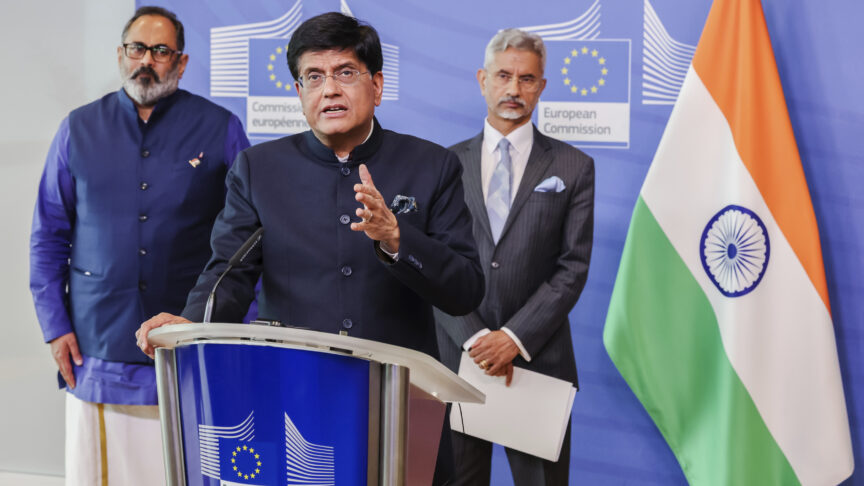China – a challenge for the long term
The basis of a new EU-US partnership should be close trans-Atlantic coordination and cooperation on China at every level, harmonising positions and pooling leverage and influence
If dealing with Afghanistan and Pakistan is urgent, and Russia difficult, then China is the long-term strategic issue on the trans-Atlantic agenda. China’s rise represents a fundamental power shift from west to east – a shift which deeply affects Europe and the US.
China is not like the Europe and US. It is not a normative power as we are, trying to universalise values, systems and ways of doing business that Europe and the US share at a fundamental level. It is to a large extent precisely because China is not exporting its values but behaving as a realist, traditional power that it represents such a challenge to shared European and American objectives, and that this power shift is happening so quickly. By bridging restricted economic liberalisation that has produced growth of over 10% per year and unreformed political authoritarianism, China is showing autocracies the world over that there is an alternative to European and US governance, market liberalism and democracy.
There is no doubt that with China and Asia’s rise a rebalance of economic, political and military supremacy of the West is inevitable and indeed overdue. But how this rebalancing happens and what future institutions and global norms look like are of fundamental importance to Europe and the US, and it is imperative that the EU and US forge a new partnership to respond collectively to this change and defend our shared interests.
From regional to global institutions, China’s leaders are increasingly expressing their desire to play a greater part in writing and rewriting the global rules. China is already establishing multilateral groupings which exclude the West, such as the Shanghai Cooperation Organisaiton and the East Asia Summit. It is quietly leading a group of like minding partners in shifting the balance of power in the UN and other global institutions.
But it is not just in multilateral organisations that China is playing a more active role. Perhaps a more significant change is the sheer speed and reach of China’s global influence that is coming about with rapid economic growth and interdependence. The EU and US are now finding that China using its newly acquired influence is essential to solving global problems such as Darfur and the Iranian and North Korean nuclear crises. Solutions to these problems are now happening at China’s speed and through solutions acceptable to China’s ways of doing business.
It is not in Europe or the US’s interests to try and contain China or develop a hostile relationship. But neither are the EU or US individually in a position to uphold global norms against such a challenge. The EU lacks the leverage or strategic relationship the US has with China. But that relationship is based on the US’s dwindling military presence in Asia and a trade volume which the EU has overtaken. Both now need each other.
The basis of a new EU-US partnership should be close transatlantic coordination and cooperation on China at every level, harmonising positions and pooling leverage and influence. From economic reform, to security and human rights, Europe and the US share the same objectives in dealing with China. Although it does not clearly express it, Europe shares America’s vision of China acting as a “responsible stakeholder” in the international systems.
Europe-US coordination needs to be led from the top with regular consultations between an Obama Whitehouse, Barosso’s cabinet and the offices of member state Presidents and Prime Ministers. It needs particularly close cooperation between a new US Treasury Secretary and Europe’s new Trade Commissioner who will lead US and EU strategic dialogues with China. And at working level it needs cooperation and working groups on a sector-by-sector basis.
From an enforced high following the abortive attempt to lift the EU arms embargo against China in 2003-04, European and US cooperation on China has waned. Europe and the US would do well to return to the goal of that post-crisis period to establish regular transatlantic forums and summits on China. This needs to include official and track two dialogues between a wide range of EU and US institutions from foreign affairs, to military links and intelligence, to trade and environmental issues. European expertise on China currently lags far behind the US’s. Both sides have every reason to improve that situation.
China’s rise is unlikely to result in a crisis as immediate as Russia’s invasion of Georgia. And more than ever Europe and the US need China to economically succeed. But China’s success is changing the world and Europe and US cannot afford not to make it their top long-term priority to cooperate closely on the issue, as though their futures depended on it .
The European Council on Foreign Relations does not take collective positions. ECFR publications only represent the views of their individual authors.


